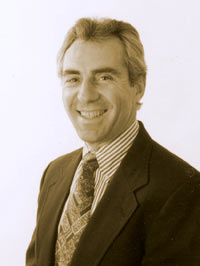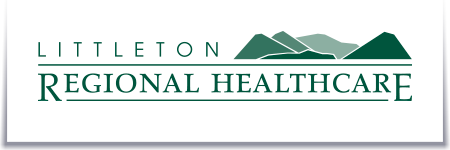Physicians through LRH History
The physician stories that follow are those for which we have reliable information, either from, for example, Littleton Hospital archives, personal interviews, newspapers, and other publications. We limited our focus to the physicians who spent most of their careers at Littleton Hospital (also known as Littleton Regional Hospital; now known as Littleton Regional Healthcare).
Prior to the founding of Littleton, NH in 1784, there were no physicians living in the area. According to the Gazetteer of Grafton County, one Dr. White, a physician from Newbury, VT, rode into town on horseback two or three times each year to treat patients with bleeding and blistering, the vogue back in the day. During the late 18th and early 19th centuries, several physicians came to town. Their medical education ranged from physician relatives’ tutelages to Ivy League medical school education. Dr. Adams Moore stood out among these former physicians. He had a reputation as a genuine scholar not only in medicine, but in the fields of science, literature, politics, and current events. It was common knowledge that Dr. Moore knew more about his adopted town of Littleton than any other person; during the last years of his life, he devoted himself to preparing a history of the town. There are many other physicians who had practiced in Littleton who were known well beyond the limits of the North Country of New Hampshire.
Dr. William Johnson Beattie
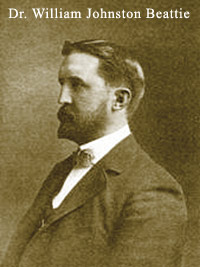 Dr. Beattie was the "prime backer" for the creation of Littleton Hospital. William Johnson Beattie, M.D., came to Littleton in 1889 from New York City with surgical skills. He was born in Ryegate, Vermont September 6, 1865, a graduate of St. Johnsbury Academy, and Bellevue Medical College in New York City. A medical emergency at the Rocks Estate in Bethlehem convinced Dr. Beattie and the family that built the Rocks Estate that the Littleton area needed a hospital. John Jacob Glessner, a Chicago industrialist, built the Rocks Estate in the late 1800s as a summer home for his family. In the early years of the 20th century, Dr. Beattie performed an emergency appendectomy on a member of the family staff on the kitchen table at the family's West Farm residence. Mr. Glessner generously donated $10,000 to start the Littleton Hospital Association. In 1906 Dr. Beattie, as President of the Littleton Hospital Association, worked to get support of the general public for the establishment of a hospital. Dr. Beattie, realizing the positive effect of good nursing, established a school for nurses and provided nurses' training at the hospital. He was the Medical Director of the hospital and president of the Board of Trustees from the first establishment of the Littleton Hospital to his untimely death in 1913. Before coming to Littleton, Dr. Beattie went to Oxford, England to visit Sir William Osler, frequently described as "The Father of Modern Medicine". Osler advised Dr. Beattie on a course of study which took him to Vienna and Berlin. In Berlin he studied under Dr. Piorkowski, who had a turtle serum that he claimed cured tuberculosis. Dr. Piorkowski trusted the ability of Dr. Beattie and taught him to make the serum. The United States welcomed Dr. Beattie with great respect upon his return to this country. Many tubercular patients from all over the country made appointments to get his help in Littleton and in NYC. "Almost every case which came under Doctors Beattie's own personal supervision has shown marked and wonderful improvement." Dr. Beattie was actively involved in his community. He represented Littleton in the NH State Legislature from 1899-1900. He was a military aide to NH Governor Chester B. Jordan in 1901, and a general in the National Guard in 1907. Dr. Beattie sat on the board of directors of the Littleton National Bank for several years. He was a member of the Littleton Board of Trade. Dr. Beattie also gave his time to the medical profession. He was a Grafton County coroner. He held memberships in the New Hampshire Medical Society, and the Association of Railroad Surgeons. He was also a member of the prestigious Doctor's Club of New York City, and the society connected with the famous Mayo Hospital in Minnesota. In late September of 1913, Dr. Beattie was at the Crawford House making arrangements to move a patient. An automobile struck him, and he died instantly. Not only was he one of the best-known physician-surgeons in New Hampshire at the time, but he was a nationally recognized tuberculosis specialist. People fondly remember Dr. Beattie as a nice person who was very popular, winning friends easily and keeping them. Though he had little time for social life, his home was an open house to his friends. Sources Colby JE, 1984. Littleton: Crossroads of Northern New Hampshire October 5, 1913 Courier Granite Monthly Magazine of Literature, p. 343-347
Dr. Beattie was the "prime backer" for the creation of Littleton Hospital. William Johnson Beattie, M.D., came to Littleton in 1889 from New York City with surgical skills. He was born in Ryegate, Vermont September 6, 1865, a graduate of St. Johnsbury Academy, and Bellevue Medical College in New York City. A medical emergency at the Rocks Estate in Bethlehem convinced Dr. Beattie and the family that built the Rocks Estate that the Littleton area needed a hospital. John Jacob Glessner, a Chicago industrialist, built the Rocks Estate in the late 1800s as a summer home for his family. In the early years of the 20th century, Dr. Beattie performed an emergency appendectomy on a member of the family staff on the kitchen table at the family's West Farm residence. Mr. Glessner generously donated $10,000 to start the Littleton Hospital Association. In 1906 Dr. Beattie, as President of the Littleton Hospital Association, worked to get support of the general public for the establishment of a hospital. Dr. Beattie, realizing the positive effect of good nursing, established a school for nurses and provided nurses' training at the hospital. He was the Medical Director of the hospital and president of the Board of Trustees from the first establishment of the Littleton Hospital to his untimely death in 1913. Before coming to Littleton, Dr. Beattie went to Oxford, England to visit Sir William Osler, frequently described as "The Father of Modern Medicine". Osler advised Dr. Beattie on a course of study which took him to Vienna and Berlin. In Berlin he studied under Dr. Piorkowski, who had a turtle serum that he claimed cured tuberculosis. Dr. Piorkowski trusted the ability of Dr. Beattie and taught him to make the serum. The United States welcomed Dr. Beattie with great respect upon his return to this country. Many tubercular patients from all over the country made appointments to get his help in Littleton and in NYC. "Almost every case which came under Doctors Beattie's own personal supervision has shown marked and wonderful improvement." Dr. Beattie was actively involved in his community. He represented Littleton in the NH State Legislature from 1899-1900. He was a military aide to NH Governor Chester B. Jordan in 1901, and a general in the National Guard in 1907. Dr. Beattie sat on the board of directors of the Littleton National Bank for several years. He was a member of the Littleton Board of Trade. Dr. Beattie also gave his time to the medical profession. He was a Grafton County coroner. He held memberships in the New Hampshire Medical Society, and the Association of Railroad Surgeons. He was also a member of the prestigious Doctor's Club of New York City, and the society connected with the famous Mayo Hospital in Minnesota. In late September of 1913, Dr. Beattie was at the Crawford House making arrangements to move a patient. An automobile struck him, and he died instantly. Not only was he one of the best-known physician-surgeons in New Hampshire at the time, but he was a nationally recognized tuberculosis specialist. People fondly remember Dr. Beattie as a nice person who was very popular, winning friends easily and keeping them. Though he had little time for social life, his home was an open house to his friends. Sources Colby JE, 1984. Littleton: Crossroads of Northern New Hampshire October 5, 1913 Courier Granite Monthly Magazine of Literature, p. 343-347

Dr. William Johnson Beattie
Dr. Barbara Beattie
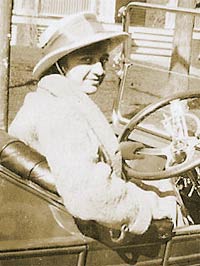 Dr. Barbara Beattie Dr. Barbara Beattie, a Littleton native and the daughter of William Johnson Beattie (co-founder of Littleton Hospital) was one of the first women doctors in New Hampshire. She was born in 1897, graduating from Littleton High School in 1914, and from Vassar College in 1920. She obtained her medical degree from the Cornell Medical School and interned at the New York Infirmary. She began her practice in Littleton in 1929 and became an authority in pediatric care. In 1938 she became a fellow of the American Academy of Pediatrics. She was the first woman appointed to the New Hampshire Board of Health. Dr. Beattie was instrumental in beginning school health and immunization clinics. She was a public school physician in Littleton, Bethlehem and St. Mary's School. She was also noted as being the first woman to own her own aircraft. She probably flew from an airstrip in Littleton's Apthorp village in a single engine plane. Her own health was poor and she died at age 58 on May 22, 1955.
Dr. Barbara Beattie Dr. Barbara Beattie, a Littleton native and the daughter of William Johnson Beattie (co-founder of Littleton Hospital) was one of the first women doctors in New Hampshire. She was born in 1897, graduating from Littleton High School in 1914, and from Vassar College in 1920. She obtained her medical degree from the Cornell Medical School and interned at the New York Infirmary. She began her practice in Littleton in 1929 and became an authority in pediatric care. In 1938 she became a fellow of the American Academy of Pediatrics. She was the first woman appointed to the New Hampshire Board of Health. Dr. Beattie was instrumental in beginning school health and immunization clinics. She was a public school physician in Littleton, Bethlehem and St. Mary's School. She was also noted as being the first woman to own her own aircraft. She probably flew from an airstrip in Littleton's Apthorp village in a single engine plane. Her own health was poor and she died at age 58 on May 22, 1955.

Dr. Barbara Beattie
Dr. James G. Bogle
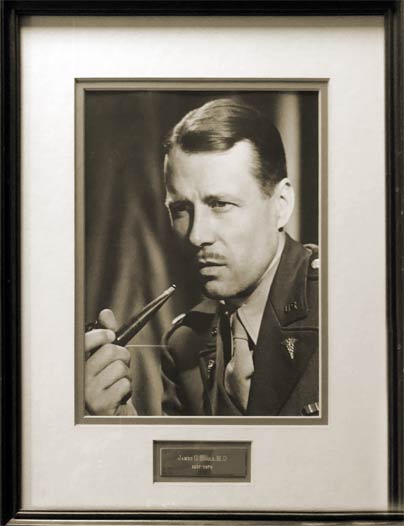
James Grinnell Bogle was born in Scotland. He graduated in medicine and surgery from Edinburgh University in 1925. He was a fellow of the Royal College of Surgeons in Edinburgh and completed his residency in gynecology at the Lakeside General Hospital in Cleveland, Ohio. From 1931 to 1936 he practiced medicine in Gilman, Vermont. In 1936 he accepted an invitation to take over the practice of Dr. Arthur T. Downing at 13 Main Street, Littleton, NH. From 1942 to June of 1945 Dr. Bogle served as a major in the US Army Medical Corps. At Fort Bragg he became a surgeon in the 41st Evacuation Hospital, seeing service from Omaha Beach on D-Day+6 to the Elbe River. After the war, Dr. Bogle resumed his practice in Littleton. He served as chief of the surgical staff at the Littleton Hospital for almost twenty years, retiring in 1975. In his spare time Dr. Bogle hunted, fished, skied, and played bridge. He also played the piano and collected primitive New England art.
Sources
Colby JE, 1984. Littleton: crossroads of northern New Hampshire
Personal communications with Bonnie Farrer, Helen Crawshaw, and Sarah Gable (Dr. Bogle's three daughters, October 2018)
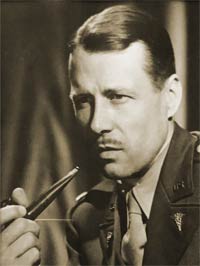
Dr. James G. Bogle
Dr. Robert G. Gale
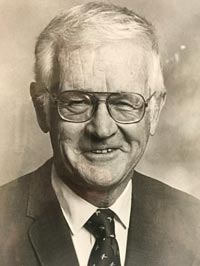
Robert G. Gale was born in Stowe, VT in 1919, graduating from Middlebury College in 1941. Dr. Gale always loved sports, and was an accomplished athlete at Middlebury. In 1944, he received his medical degree from the University of Rochester School of Medicine in New York and did his internship and residency at Strong Memorial Hospital in Rochester (which is now an 830 bed medical center/teaching hospital of the U. of Rochester School of Medicine). From 1946 to 1948 he trained at Vanderbilt University Hospital on a medical fellowship, where Dr. Gale co-authored an article published in the American Heart Journal in 1949. The title of the article is "Plasma tocopherol levels in cardiac patients". He then completed two more years of training in Rochester, NY.
Dr. Gale practiced at the Fitch Clinic in St. Johnsbury, Vermont from 1950-1952, after which time he began his Internal Medicine practice in Littleton in August of that year. He was called to active duty in 1953 during the Korean War and served two years as a captain in the U.S. Army Medical Corps, practicing cardiology at Fort Hood, TX. Upon discharge from the Military, Dr. Gale settled in Littleton, where he practiced from 1955 until 1987. While at Littleton Hospital, Dr. Gale served as Chief of Medicine, and he established Littleton Hospital's intensive care unit.
Always an avid outdoorsman, Dr. Gale was a New Hampshire Fish and Game Commissioner between 1975 and 1985. He enjoyed hunting, fishing, and boating. Dr. Gale was player agent for the Little League of Littleton from 1952 to 1970 from its inception to the opening of the "new field" at Remich Park. Also, he was a member of the F and AM (Free and Accepted Masons) Burns Lodge in Littleton and the Littleton Lodge of Elks. Dr. Gale was a member of the NH Medical Society and the Trudeau Society. The Trudeau Society was named to honor Edward L. Trudeau. He was the pioneer who founded an early (if not the first) tuberculosis sanatorium in America at Saranac Lake in New York in the early 1900s.
Littleton Hospital named its medical library in Dr. Gale's honor. His photograph proudly hangs on a wall in the current Gale Medical Library/Anna Connors Patient & Family Resource Center.
Sources
(August 12, 1987) Littleton Courier microfiche
Colby, Jack, ed. Littleton: Crossroads of Northern New Hampshire, Town of Littleton, 1984.
Murray JF et al. Evolution and Revolution. American Journal of Respiratory and Critical Care Medicine 2012; 186(10):948-952.
Lemley JM, Gale RG, et al. Plasma tocopherol levels in cardiac patients. American Heart Journal.1949; 37(7):1029-34

Dr. Robert G. Gale
Dr. Dale R. Childs
×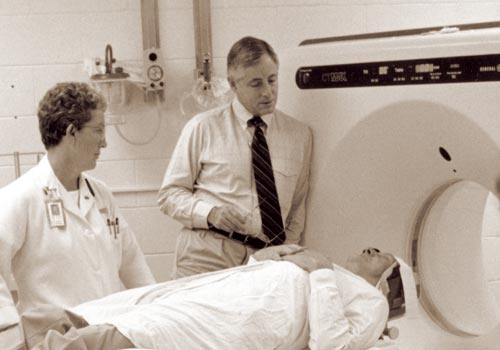
Dale Childs was born in Miami, Florida in 1940. He graduated from Harvard University in 1962 and from the University of Vermont Medical School in 1966. He did his internship at the University of Vermont Medical (UVM) Center after which he joined the U.S. Navy serving as General Medical Officer in Brunswick, GA. In 1969 he returned to UVM for his residency in Diagnostic Radiology which he completed in 1972. That same year Dr. Childs came to Littleton Hospital in charge of the Radiology Department, which he updated and expanded to include ultrasounds, nuclear medicine, CAT scans and Magnetic Resonance Imaging. His greatest accomplishment was pioneering the use of Interventional Radiology (supplying images to perform invasive procedures, such as biopsies, drainages and stent placements).
During the time Dr. Childs practiced at Littleton Hospital he truly appreciated the close working relationships with other physicians and surgeons which enabled individual (personal) attention to each patient. He worked closely with Dr. McDade, helping him with images that made his vascular surgery most effective. Dr. McDade was the only surgeon at Littleton Hospital doing vascular surgery when Dr. Childs arrived. In addition to having a strong core of doctors to work with, Dr. Childs noted that it was wonderful having had a "good crew" of stable radiology technicians with whom he worked.
The most challenging part of his 42 year practice at Littleton Hospital was that it was full time, 24 hours a day, 7 days a week. He took one week off per year. He read x-rays every day and if another doctor needed his help, he was available to them any time of day or night. The other challenge was keeping up with new technologies. It was difficult to make time to learn new techniques and keep up with the availability of new methods, given his rigorous work schedule. Littleton Hospital was the only one in the area using many of the new techniques, so he had no one nearby with whom to compare progress.
In addition to all the changes in technology, the biggest change Dr. Childs observed during his practice was to see independent practitioners move to being institutional doctors.
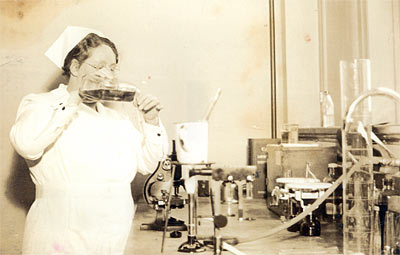
Marian Shaw
Dr. Childs is duly proud of his mother, Marian Shaw, who was the first x-ray and lab technologist at Littleton Hospital (photo 1936). He is also proud of his two daughters, both of whom are physicians. One practices neuro-radiology; another is the CEO of Planned Parenthood of Massachusetts.
During Dr. Child's life in Littleton, in addition to his medical practice, he raised five children, each one graduating from Littleton High School as Valedictorian. In his spare time he coached high school tennis and Little League baseball. He also directed a chorus of young singers.
Source:
Amy Bahr, personal communication with Dr. Childs, Sept. 1, 2018
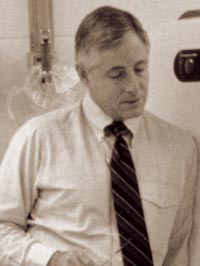
Dr. Dale R. Childs
Dr. Parker A. Towle
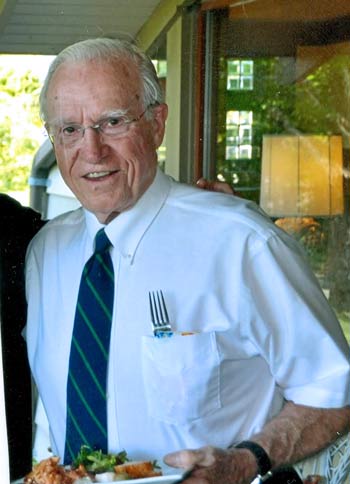
Parker Towle was born in Holden, Massachusetts. He graduated from Yale University in 1955 and received his medical degree from the University Of Vermont College Of Medicine in Burlington in 1959. He did his internship and first year of residency in neurology at Bethesda, MD, Naval Hospital. He spent three years in the Navy as a Lieutenant at Jacksonville Naval Hospital in Florida after which he returned to Yale University Medical School to complete his residency.
Dr. Towle practiced neurology in Norwood, MA from 1966-1980. He was a clinical instructor in neurology at Harvard Medical School teaching neurology to medical student interns and residents at Boston City Hospital, and had staff affiliations with several Boston area hospitals. Dr. Towle is certified by the Board of Psychiatry and Neurology and is a member of American Academy of Neurology and the Society of Clinical Neurologists.
In 1979 Dr. Andrew Ross, internal medicine and cardiology doctor, was instrumental in getting an EEG machine donated to Littleton Hospital. Then he needed a doctor who was capable of interpreting the EEGs. Dr. Ross convinced Dr. Towle to come to Littleton Hospital. Leonard Reed, acting CEO of the hospital at the time, encouraged Dr. Towle to resettle in Littleton. Dr. Towle appreciated Mr. Reed as a steadying influence in managing the hospital.
In 1980 Dr. Towle and his family moved to New Hampshire. He came to work at Littleton Hospital as the first neurologist in the North Country. He started a solo practice at the hospital. His job included spending four days at Littleton and Wednesdays in Berlin and Colebrook or North Conway. He also visited hospitals in Woodsville, Lancaster, St. Johnsbury, VT and Plymouth. He enjoyed teaching neurology and volunteered his services to teach Dartmouth Medical School students and residents. Beginning in 1997 Dartmouth Hitchcock hired him as a salaried employee. Dr. Towle is an avid hiker, providing one more reason to live in the North Country.
For several years during the 1990s Dr. Towle was Chief of Medicine at Littleton Hospital. During that period he got to know the staff members well. What he remembers with much pleasure is all the personalities of the people he worked with. "They were special people." He enjoyed and appreciated the talent of Sandy Trenholm, the first trained EEG Tech. Dr. Towle found Ramesh Dave a talented pathologist and colleague. He feels privileged to have worked with a group of excellent doctors including Drs. Caswell, Pritham and McDade. Dr. Towle, with many others, got particular enjoyment from the Christmas skits for which Dr. Childs rewrote words of popular musicals which the doctors performed for everyone's entertainment during the Littleton Hospital annual staff Christmas parties.
Dr. Towle feels one of his most meaningful accomplishments was promoting the establishment of support groups for patients and families of Alzheimer and Multiple Sclerosis sufferers, and, particularly, founding the free clinics, all held near the hospital. Free clinics were held for three years in the new Littleton Hospital building in 1990s and all the doctors and pharmacist, Bill Spencer, volunteered their time. After three years Noreen Williams formalized the free clinics under the auspices of a federally qualified health clinic (FQHC) now known as Ammonoosuc Community Health Services (ACHS).
While holding his position at Littleton Hospital, Dr. Towle attended Vermont College in Montpelier and in 1989 earned his Masters of Fine Art in Poetry. He was on the Board of the Frost Place in Franconia for twenty-five years. Because Dr. Towle's family had known Dr. McDade for many years through the Appalachian Mountain Club (AMC), he gave a memorial slide show at the Highland Center in Crawford Notch for Dr. McDade. The show included many photos provided by Mrs. McDade.
Dr. Towle has published seven books of poetry. He is currently an Editor at The Worcester Review, a literary journal which he has helped edit for over twenty years. He finds connections between neurology and creativity. While at Littleton Hospital Dr. Towle wrote a poem for Dr. Caswell, which he read at the dedication of the H. Taylor Caswell, Jr. Physicians' Office Building and Conference Center in 2003. Part of the poem is included on the brass plaque at the entrance of the building. Dr. Towle retired from Littleton Regional Hospital in 2008 when he joined Dartmouth-Hitchcock Medical Center as a staff neurology resident supervisor.
Source:
Amy Bahr, personal communication September 2018
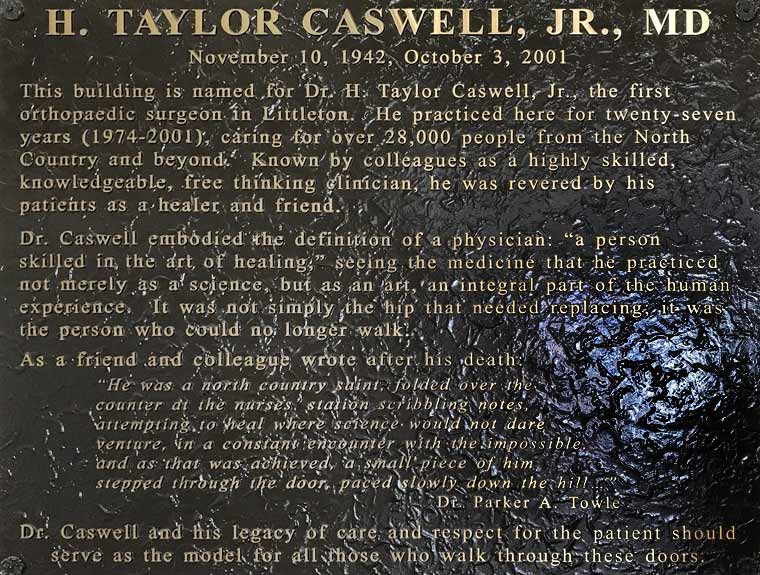
Medical Office Building Conference Center Plaque commemorating Dr. Taylor Caswell includes Poem by Dr. Parker A. Towle
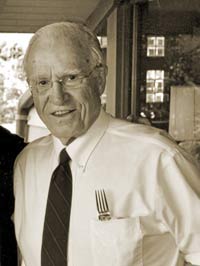
Dr. Parker A. Towle
Dr. Harry C. McDade, Jr.
×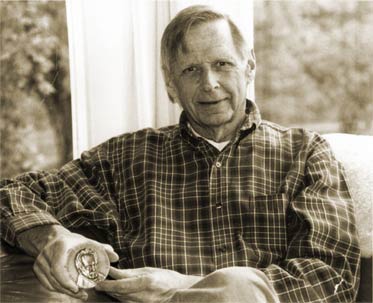
Harry C. McDade, Jr. was born on March 13, 1924 in Philadelphia PA. He was a naturalist and a surgeon. He graduated from the University of Pennsylvania in 1943 and Hahnemann Medical College in 1947. After completing his medical residency at Atlantic City Hospital in Atlantic City, N.J. in 1949, he served as a lieutenant in the Medical Corps from 1951-1953. He did his surgical residency at Mary Hitchcock Memorial Hospital in Hanover, NH and the Veterans' Administration Hospital in White River Junction, VT. He joined the surgical staff at the Littleton Hospital in 1959 Harry McDade developed Littleton Hospital's first disaster management plan in the 1960s.
Dr. McDade was considered one of New England's top expert physicians for cold weather injuries and emergency medical care. Kent Olson of the NH State Emergency Medical Services (EMS) Program said (of Dr. McDade) "We'd call him even in the surgery room for advice, and we eased the pain of a lot of people in the mountains, and perhaps even saved a life or two, because we had Harry on the other end of the line. We'd radio up to the mountains some damn fine medical advice. That's quite a hook-up."
Medicine widely recognized Dr. McDade for his professional expertise and contributions. He was certified with the American Board of Surgery in 1961. He became a Fellow of the American College of Surgeons and International College of Surgeons in 1962. He was a member of the New England Surgical Society, a N.H. Representative to the Executive Committee of the New England Surgical Society from 1989 to 1995, the Northeast Medical Association, NH-VT Trudeau Society, New Hampshire Medical Society Judicial committee through 1993, the Rocky Mountain Traumatologic Society, and a member of the Society of the American Gastrointestinal Endoscopic Surgeons. He served as the president of the Grafton County Medical Society, New Hampshire Medical Society, and as State of New Hampshire Governor at Large for the American College of Surgeons from 1987 to 1993.
Dr. McDade is recognized for directing and personally managing the critical care response to the 1967 Cog Railroad disaster. He was a founding member of the American Trauma Society in 1974 and chairman of the NH Committee on Trauma of the American College of surgeons from 1972- 1988.. At one time he was a director of the Advanced Trauma Life Support Course for the State of NH Medical Society. In 1996 the New England Surgical Society awarded Dr. McDade its prestigious Nathan Smith Award "In recognition of exceptional professional contributions within the field of surgery." In 1995, the year he closed his practice, he received the NH Hospital Association James A. Founders Award for service to healthcare in NH.
Linda Culver, a retired nurse from Littleton Hospital, recounted the following story, which shows the innovative approach Dr. McDade used in his practice. "Years ago, a young local boy was mauled by a bear and lost a lot of his scalp. When the boy was brought to the hospital, Dr. McDade made someone go back and look for the missing scalp, and successfully reattached it."
In addition to his other accomplishments, Dr. McDade was an aviator and a mountaineer. He served as a certified Federal Aviation Administration (FAA) Aviation Medical Examiner form 1972-1995 and as an FAA Aviation Accident Investigator while he was a member of the Aerospace Medical Association and the Flying Physicians Association. He received the American Alpine Club David A. Sowels Memorial Award, an honor bestowed on a mountaineer, distinguished by unselfish devotion at personal risk or at sacrifice of a major objective, for assistance to climbers imperiled in the mountains in 1992, the EMTs Pre-Hospital Life Support Emergency Medical Service Award in 1984; the A.H. Robbins Community Service Award of the NH Medical Society in 1981, and the Littleton Citizen of the year Award for Cannon Mountain rescues in 1959.
He was one of the first ham radio operators in Littleton. In his spare time, Harry McDade was among champion pistol shooters who participated in civil defense pistol matches. In 1964 Dr. McDade partnered with Thomas I. Pillsbury to purchase and develop 1,169 acres of land on Mann's Hill. He held practice shooting at his home on Mann's Hill before the organization of the Alderbrook Sportsmen's Association.
Dr. McDade's concern for the environment and search for knowledge prompted his travels from Alaska to the Andes and from the North Pole to Martinique. Of his travels, Dr. McDade said "I fly because I like to fly. I like the navigation part, diving down into a fjord. I do use it professionally sometimes. In going to meetings, I will fly before I drive." Dr. McDade had a "particular interest" in the Pondicherry Wildlife Refuge in Jefferson and Whitefield and actively opposed making the I-93 stretch through Franconia Notch a four lane highway. About Franconia Notch he said "I'd like as simple a roadway as we can have in there. Historically, it's been a way to get through the mountains, ...but it's been uniquely scenic. It's hard to mix tourists with high-speed, through traffic."
Sources:
Littleton Courier 1997
Littleton Hospital news releases
New Hampshire Profiles
Colby JE, 1984. Littleton: crossroads of northern New Hampshire
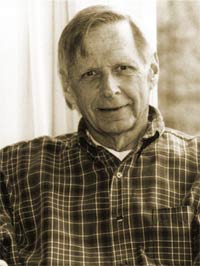
Dr. Harry C. McDade, Jr.
Richard (Dick) Monroe, MD
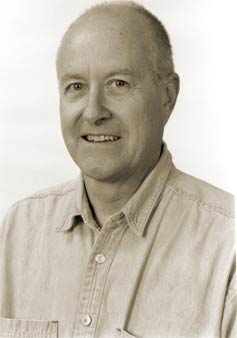
Doctor Monroe practice general surgery at Littleton Hospital from November 11, 1967 to September 9, 1999. When Dr. Monroe started practicing in Littleton, he received questions such as, "Where were you a few months back?" Where were you when we really needed you?" These questions related to the Cog Railway incident that occurred on Sunday, September 17, 1967, when first responders took over 70 people in need of health care from Mount Washington to Littleton Hospital.
Richard Monroe was born on July 20, 1934, and grew up in the Baltimore, MD area. He was the son of an engineer and the grandson of a general medical doctor in Westminster, MD, a suburb of Baltimore. Dick's grandfather's office was at home, and was a self-contained medical practice. By today's standard, his practice was similar to an urgent care center. Spending time around his grandfather's office, Dick was curious about what he did within the walls of this house and he decided to pursue a career in medicine. He attended Haverford College followed by Johns Hopkins Medical School from 1956-1960. Subsequently, Dr. Monroe completed a one-year general internship followed by a four year general surgery residency - both at Allentown General Hospital in Allentown, PA.
At the end of his graduate medical education, Dr. Monroe began his two-year commitment to the military, which he began soon after completing his general surgery residency. He spent one year at McDonald Hospital at Fort Eustis, Virginia. He was then assigned to Viet Nam. Departing from a military airfield in El Paso, TX, Dick did not learn about the upcoming assignment until reaching flying altitude. The aircraft landed at an airfield in Vietnam under the cover of night. Dr. Monroe spent two years as director of a mobile surgical team. Once Dr. Monroe convinced his superiors that they were wasting precious time when using the mobile unit (helicopters were now used to transport the wounded), he began performing surgery at the 93rd Evacuation Hospital in Long Binh, which is near Saigon. The most common injuries requiring surgery were the result of gunshot wounds and roadside bombs.
When Dr. Monroe returned from Vietnam, he went to Fort Dix, NJ, as he still had to serve three months in the military. During this time, he began looking for a location to set up a general surgery practice. His passion for New Hampshire began as a young boy, having attended Camp Wallula on Little Lake Sunapee for 8 summers. While there, he experienced hikes atop Mount Washington and Cannon Mountain. The NH Medical Society encouraged Dick to contact Dr. Harry McDade, as Littleton Hospital was looking for a general surgeon. Dick wrote Harry a formal letter, which prompted Harry McDade to phone Dr. Monroe. Since Dr. McDade was the only surgeon (and a very busy one) at Littleton Hospital at the time, he was hoping to recruit another physician to set up an independent surgical practice, who would provide assistance during complex surgeries, and share in performing the increasing number of surgical cases at Littleton Hospital. Dr. Monroe spent a week shadowing Harry McDade. The two surgeons climbed Mt. Lafayette together, had dinner at the Greenleaf Hut, and observed a magnificent sunset on the hike down to the trailhead. The events of this week in the North Country solidified Dr. Monroe's determination to settle in the Littleton area. He began practicing in Littleton on November 11, 1967. His first office was in a home on Main St., Littleton, beside the Congregational Church. Once the hospital had office space at its Cottage St. location, Dr. Monroe moved his practice to the new location. He remained in practice until September of 1999.
When Littleton Hospital first had a designated Emergency Room, the medical and surgical physicians rotated taking call. Between the late 1960s and 1970s, the volume of patients coming to the Emergency Room increased considerably. Dr. Monroe mentioned that the existing "call" system was becoming burdensome to him and the other physicians, who were maintaining their office practices, visiting inpatients at the hospital, making home visits, and taking calls to the Emergency Room. The hospital began staffing the Emergency Room with a full time Emergency Room physician in November of 1976. This change alleviated this situation.
Dr. Monroe would like to be remembered as a physician with a good bedside manner. Patients appreciated his smile, and his kindness in making home visits to patients recovering from surgery. He was extremely dedicated to his patients, once spending three days in the hospital's new intensive care unit carefully caring for a teenage patient on a respirator. She was the only survivor of six people in a serious head-on collision on Route 93, which at the time was just a two lane road. Dr. Harry McDade and Dr. Monroe had performed 15 hours of trauma surgery to keep the young lady alive. She was on life support, and Dr. Monroe did not leave her side for three days. Once the young lady recovered, she asked her parents to bring her for a visit to Littleton so she could see this community and meet the people who saved her life. Years later, this woman's family invited Dr. Monroe and his wife, Sandy, to her wedding.
Doctor and Mrs. Monroe still live in Littleton. They raised their family here, and continue to be active members of the Littleton Community.
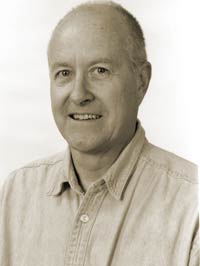
Richard (Dick) Monroe, MD
Dr. H. Taylor Caswell
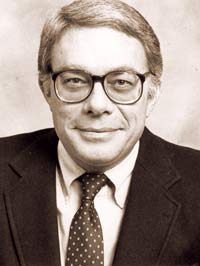
H. Taylor Caswell was born November 10, 1942 in Philadelphia, PA. He graduated from Colgate University in 1964. He earned his medical degree from Temple University School of Medicine in Philadelphia in 1968 followed by a one year internship at the Geisinger Medical Center in Danville, PA. He completed an orthopaedic surgery residency at Temple University Hospital in 1973. Some of his training included work at the Shriner's Hospital for Crippled Children in Philadelphia. In 1973 he served in the U.S. Navy at the Naval Hospital in Portsmouth, NH as Lieutenant Commander and chief of professional services. In 1974 Dr. Caswell joined the staff at the Littleton Hospital as the first orthopaedic surgeon in the area.
As a fellow of the American Academy of Orthopaedic Surgeons, Dr. Caswell served on the Board of Councilors, Advisory Panel on Government Affairs, and as chairman of the Health Issues Committee. He was a fellow of the American College of Surgeons, and was president of the New Hampshire Orthopaedic Society from 1977-1978.
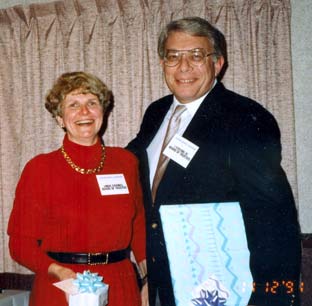
Dr. Caswell practiced at the Littleton Regional Hospital for twenty eight years. He served as chief of staff and was vice chairman of the Board of Trustees at the time of his death on October 3, 2001. Dr. Caswell tirelessly served more than 27,000 patients in Northern New Hampshire and Vermont including both pediatric and adult patients. In addition, Dr. Caswell was a medical adviser to the Cannon Mountain Ski Patrol, moderator of the First Congregational Church of Littleton. In his spare time, Dr. Caswell enjoyed golfing with friends.
Dr. Caswell's career at Littleton Hospital included considerable work in the Emergency Department. Given Littleton's proximity to a number of ski areas, ambulances frequently transported injured skiers to Littleton Hospital. Dr. Caswell's wife Linda was active in the Hospital Auxiliary, serving as president from September 1988 to September 1991. Many remember Dr. Caswell for his wit. His father was a general surgeon at Temple University Hospital. His son, Ken, who also trained at Temple, is a radiologist in Massachusetts. His eldest son, H. Taylor, returned to NH after time working in Washington, DC to dedicate his career in public service to community and economic improvement for the people of the state of NH.
Sources
(2001 October 16), The Caledonian-Record Online Edition
H.T. Caswell (personal communication, December 2018)
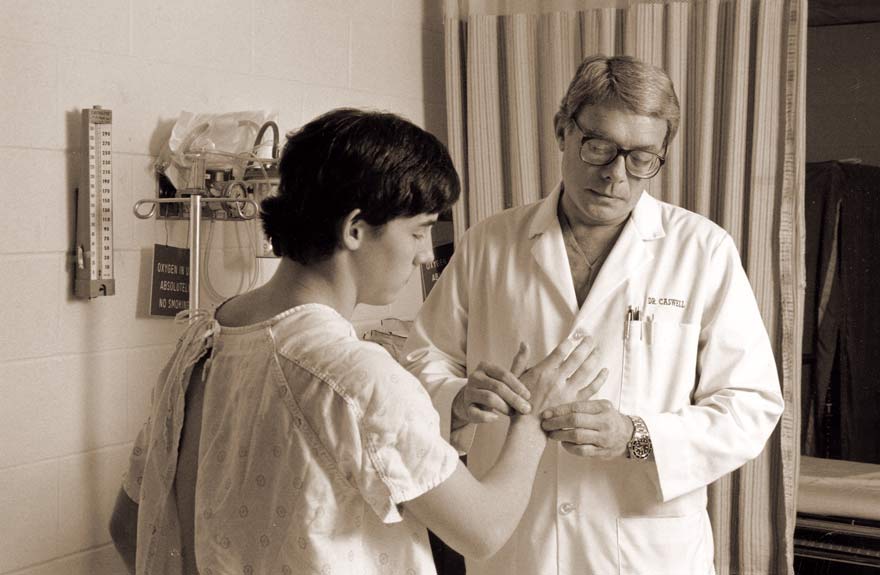

Dr. H. Taylor Caswell
Charles Copenhaver, MD
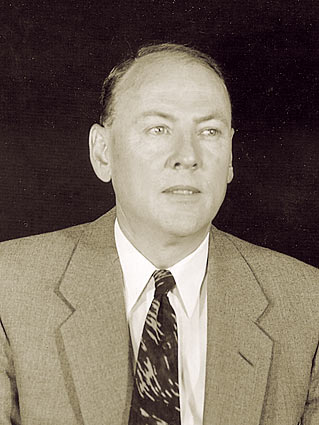
Charles Copenhaver, MD's inspiration for a career in medicine came early in his life. When just eight years old, he hurt his arm and was frightened, until an elderly physician reassured him that he was going to be OK. The story passed down to his son Robert, goes like this. "An elderly doctor took my hand in his hand and told me that I was going to be okay and that he would take care of me. I wanted to be just like him."
Dr. Charles W. Copenhaver came to North Woodstock, NH in 1936 from Bristol, Tennessee, to fill in temporarily for his brother Dr. Leslie Betz Copenhaver. In June of that year, Dr. Charles Copenhaver set up a general practice in a home office at 26 Union Street in Littleton. Because he began his practice during the Depression, early on, his patients often paid for the office visit in wood or various garden produce instead of cash. Sometimes he was paid in maple syrup instead of money, but his favorite item was calve brains from a special farmer friend. It was over a month before the first patient came to him. The summer people in Bethlehem really helped him get started and made it possible for him to stay in Littleton.
When Dr. Copenhaver started his practice, he spent mornings in the operating room and cared for patients in the office from 1 pm to 3 pm. His fee was $1.00 per patient. His day was not finished, however, as house calls took him to patients' homes each day from 3 pm to 5 pm. The cost of a house call was $3.00 per call. Dr. Copenhaver reserved between 6 pm to 8 pm each evening for office calls back at his house. Before the Littleton Hospital had an emergency room, the six doctors in town all joined a party line with one telephone number for night emergency calls. He said "The night I was on call, I had the line ring in my home and when I was not on call, I disconnected the ringer. The doctors all worked this out together." Drs. Bogle, Eaton, and Dudley worked in Littleton with Dr. Copenhaver. They consulted each other when confronted with a complicated medical issue. He greatly appreciated the collegial influences and felt especially rewarded when he "could make a meaningful change to one's life.
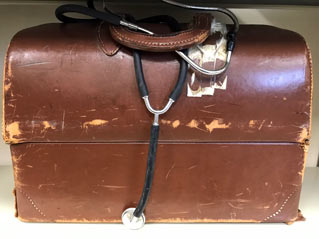
Back in the day, Dr. Copenhaver said "the doctor was expected to have the same families for life. You delivered their babies. You took care of everyday health needs and consoled them at the end of life." As medicine became more of a business he "felt the loss of the patient doctor relationship. It was my goal to be the best doctor I could, just like the doctor that took care of me when I was a child."
He was a member of the Grafton County Medical Society and the Littleton Rotary Club. He served on the board of directors of the Littleton National Bank for almost twenty years. His wife, Ann, was president of the Women's Auxiliary of the Littleton Hospital. Dr. Copenhaver retired on April 1, 1977 after forty-one years of practice.
Sources
Colby, Jack, ed. Littleton: Crossroads of Northern New Hampshire, Town of Littleton, 1984.
R. Copenhaver (personal communication, December, 2018)
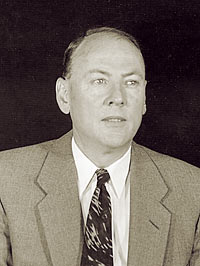
Charles Copenhaver, MD
Dr. Howard G. Pritham
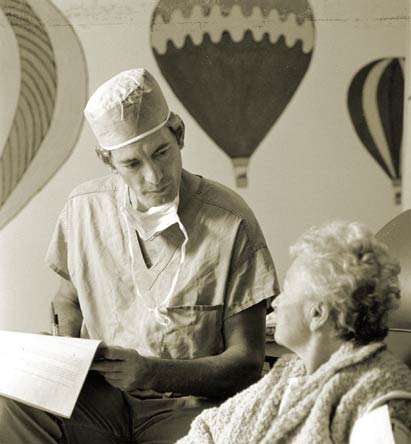
Dr. Pritham graduated from Tufts University School of Medicine in 1966. He spent one year as a general surgery intern at Mary Hitchcock Hospital in Hanover, where he met Dr. David Bishop (well-known Family Medicine physician in Littleton), also interning at Mary Hitchcock at this time. In 1967, Dr. Pritham joined the Navy as a general medical officer, a post which he served for three years during the Vietnam War. While stationed at the naval base in Norfolk, VA, Dr. Pritham served as the ship physician on APA-44 which carried landing craft and marines for beach assaults. He spent six months on the USS Fremont in the Mediterranean and one month at Guantanamo Bay in Cuba during 1967-1970. In 1970 he returned to Mary Hitchcock to complete his four year General Surgery residency. Dr. Pritham joined the Littleton Hospital staff in 1974 as a result of a chance meeting with Dr. McDade at an American College of Surgeons conference in Chicago. Dr. McDade impressed Dr. Pritham and made him aware of the need for surgeons in Littleton. Dr. Pritham wanted to work in the country as he is an outdoors man. His grandfather, "Old Doc Pritham", who practiced in Greenville, Maine had a strong influence on the younger doctor. Dr. Pritham appreciated working with the seasoned physicians in Littleton, including Dr. Harry McDade, Dr. Frank Dudley, Dr. Charles Copenhaver, and Dr. Eugene McGregor. These medical men were the first to alert him of the concern about the unintentional changes that enactment of Medicare on July 30, 1965 would bring.
Dr. Pritham considers the heart of the hospital to be the many good people with whom he worked, including doctors, nurses, and others. He appreciated having a Surgical Grand Rounds program, where doctors could work together to discuss cases, ultimately benefiting their patients. He felt privileged to review each surgical case beforehand with such talented physicians, Dr. Ramesh Dave, pathologist, and Dr. Dale Childs, radiologist. Dr. Pritham established the Littleton Hospital Tumor Clinic in 1974 through a National Institutes of Health (NIH) program for early detection of breast cancer. His wife, Ellen, devoted much time to this project, working side by side with her husband as the Tumor Clinic Registrar. Dr. Pritham donated much of his own time to coordinate this program.
Some of the biggest changes in medicine during Dr. Pritham's career included developments in transportation and scientific discovery. The improved roads and the helicopter service provided life saving time transporting patients to regional medical centers quickly. For the general surgeon setting up a practice in the 1970s, the advent of subspecialties in surgery over the decades resulted in limiting what the general surgeon did (back in those days, the well-trained general surgeon performed all kinds of surgery, including thoracic, ENT, gynecological, C-sections, as well as abdominal surgery.
Dr. Pritham was totally dedicated to caring for his many patients. He learned a strong work ethic from his grandfather, "Old Doc Pritham". He fondly remembers being very connected to all members of the medical staff at Littleton Hospital. He also recalls the challenges resulting from the changing business models in healthcare, the trend for physicians becoming hospital employees and the resulting focus on productivity, and the advent of the electronic medical record.
There are several other doctors in the family, including Dr. Pritham's son Greg. Greg practices Urology in Bozeman, Montana. Also, his brother Robin practiced Family Medicine at Eastern Maine General Hospital (now known as Eastern Maine Medical Center). His wife, Ellen worked with him as a nurse at Littleton Hospital and spent many years volunteering time with the Littleton Hospital Auxiliary. She also ran Duck Soup, a successful Main Street Littleton specialty store in Parker's Marketplace, for many years. During retirement, Dr. Pritham enjoys working outdoors on his small farm, gardening, haying, and cutting firewood. He lies about fly fishing, catching his limit every time.
Source
H. G. Pritham (personal communication, December 3, 2018)
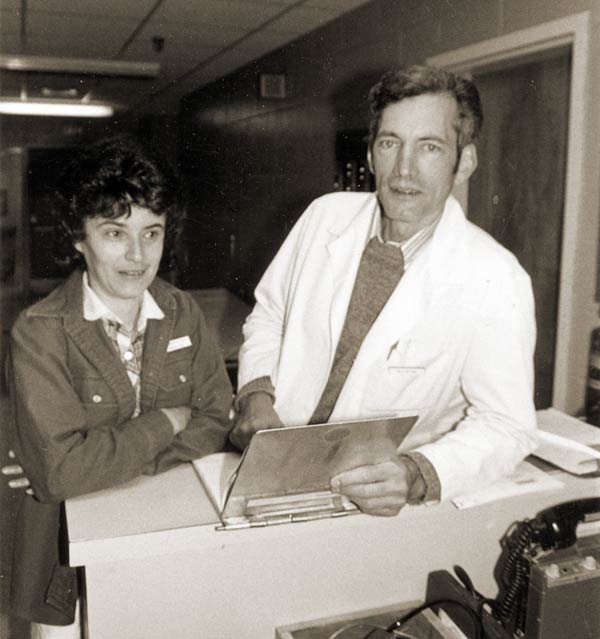
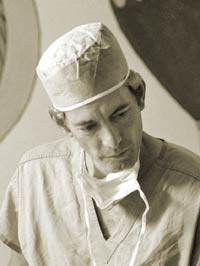
Dr. Howard G. Pritham
Dr. David E. Bishop
×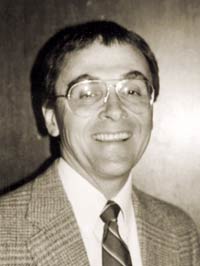
Dr. Bishop has long ties to the Littleton area, as his father, grandfather, and great grandfather were born in Bethlehem, NH. His grandmother, Elizabeth LaFlamme, graduated in the first class of the Littleton Hospital School of Nursing. Dr. Bishop opened his Family Medicine practice in Littleton in 1969. He remained in practice for the next 31 years.
Dr. Bishop attended Dartmouth Medical School for two years and finished his medical school education at Jefferson Medical College in Philadelphia in 1966. Dr. Bishop completed his internship at Mary Hitchcock Hospital in Hanover in 1967. Here he met Howard Pritham, MD, as they interned together. At the time, they did not know that one day that would practice together in Littleton. The Army called Dr. Bishop. He served in Vietnam from 1967-1968 and followed this tour with a year at The United States Military Academy at West Point.
Dr. Bishop, a board certified Family Physician, was known for his ability to form meaningful relationships with his patients. He appreciated the culture of people living in the North Country. An understanding listener, Dr. Bishop learned so much about his patients, and was able to take care of "the whole person" (and in many cases, the whole family). Dr. Bishop served Littleton Hospital as Chief of Staff twice. During his tenure, he was involved in delineating the roles and responsibilities of the Littleton Hospital Board of Trustees and the Medical Staff. He fondly remembers the camaraderie among the physicians at Littleton Hospital, and he owes a debt of gratitude to his predecessors for their mentorship and support (in particular Dr. Harry McDade).
Although Dr. Bishop retired from Medicine in 2000, he did not slow down. After six years of teaching middle school English and high school History in Lisbon, NH, he worked in landscaping, designing and planting perennial flower beds. In addition, Dr. Bishop built many beautiful stone walls in the area over the years. He has a strong sense of "community", serving on the Bethlehem and Profile School Boards for 25 years. He and his wife, Lynn, raised four children here in the North Country. It is their success and the many friendships among his patients and his peers that Dr. Bishop regards as his legacy. Dr. Bishop continues to enjoy life with his wife, Lynn, engaging with friends and family, and enjoying his many hobbies.
Sources
Colby, Jack, ed. Littleton: Crossroads of Northern New Hampshire, Town of Littleton, 1984.
D. Bishop (personal communication, November 5, 2018)

Dr. David E. Bishop
Dr. John Phillip Sauter
×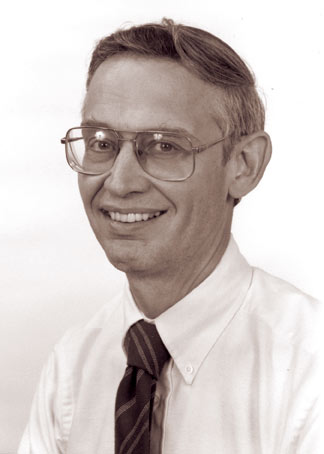
John P. Sauter was born in Clinton, New York. He graduated from Hartwick College in Oneonta, New York. He decided that going to medical school was a logical step because he enjoyed biology in college. He discovered gynecology on a clinical rotation during his fourth year of medical school and the first obstetrics/gynecology (OB/GYN) rotation of his internship. He earned his medical degree from the State University of New York Upstate Medical University in Syracuse in 1974. Dr. Sauter completed his internship at Mary Imogene Bassett Hospital in Cooperstown, New York, followed by an Obstetrics and Gynecology residency at the Medical Center Hospital in Burlington, VT.
Dr. Sauter worked summers in Littleton for the US Forest Service from 1968-1972. Liking the White Mountains in a special way, he moved to Littleton, NH immediately following his residency. He started his practice in Littleton in 1979. Although there appeared to be some question of the need for an OB/GYN physician in Littleton when Dr. Sauter started, he has more than proved his worth. In his 40 years of service at Littleton he has shared in the excitement and joy of well over 6000 deliveries, serving as the obstetrician to three generations of some families. He is certified by the American Board of Obstetrics and Gynecology. The NH Hospital Association honored Dr. Sauter as Medical Staff Person of the Year in 1989; the Littleton Area Chamber of Commerce chose Dr. Sauter to be Citizen of the Year in February of 2016.
Dr. Harry McDade's work ethic and positive attitude concerning the ability of a small hospital to accomplish great things inspired Dr. Sauter to emulate Dr. McDade's achievements. Dr. Sauter was a leader in the decision to build the new hospital in its current location, chairing the Littleton Hospital Board of Trustees at the time. He is pleased to have witnessed the growth of the hospital with its up-to-date facility and expansive campus, bringing much needed specialty services to people in the Littleton Regional Healthcare service area.
Sources
Colby JE, 1984. Littleton: crossroads of northern New Hampshire
Personal Communication, December 2018
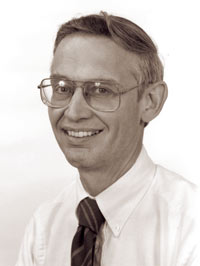
Dr. John Phillip Sauter
Dr. Ramesh P. Dave
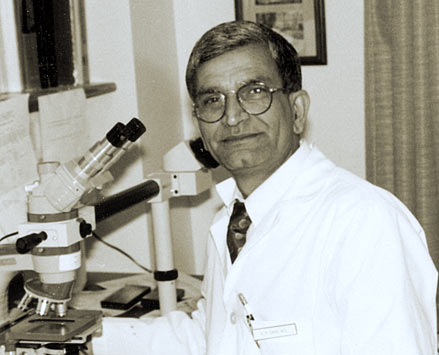
Ramesh P. Dave was born in Gujarat, India in 1940. Gujarat is a state in Northwest India. After high school, Dr. Dave received his B.S. degree from the M.G. Science Institute in the city of Ahmedabad in Gujarat. In 1969 he graduated from the B.J. Medical College in Ahmedabad, and practiced Family Medicine at a health center in Khadadhar until 1970. Dr. Dave came to the United States in November of 1970. He spent the next two years at Memorial Hospital in Manchester, Connecticut where he completed preliminary post-graduate medical training. North Carolina (N.C.) Baptist Hospital and the Bowman Gray School of Medicine in Winston-Salem accepted Dr. Dave to their Anatomic and Clinical Pathology residency program in March of 1972. Upon completion of his training in 1976, Dr. Dave began practicing pathology at Passavant Memorial Hospital in Jacksonville, Illinois. He obtained U.S. citizenship in August of 1977.
Littleton Hospital appointed Dr. Dave as pathologist on September 1, 1977, where he spent the next 29 years, retiring in 2006. Littleton Hospital greatly enhanced its services in the 1970s. Upon Dr. Dave's appointment, Littleton Hospital now had the necessary components to provide its patients with the highest level of surgical services. Now, the surgeons had the ability to consult with an expert pathologist and radiologist prior to surgery, resulting in the best possible outcomes for patients. In addition to his role in Anatomic Pathology, Dr. Dave oversaw the Clinical Laboratory at Littleton Hospital. Under his direction, Littleton's clinical laboratory functioned as a regional reference laboratory as well as an American Red Cross depository for the North Country. Dr. Dave also served as Director of Anatomic and Clinical Laboratory Services at Cottage Hospital in Woodsville, NH.
Dr. Dave was a true scholar. He was highly respected for his expertise well beyond the Littleton area. He belonged to many professional associations, including the NH and Grafton County Medical Societies, the NE Society of Pathology, the American Society of Clinical Pathologists, and the College of American Pathologists. In his retirement, Dr. Dave and his wife, Hasu, are enjoying spending time with family, traveling, visiting with friends both near and far, and reading.
Sources
Colby JE, 1984. Littleton: crossroads of northern New Hampshire
LRH archives
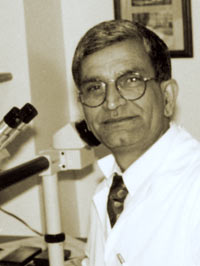
Dr. Ramesh P. Dave
Dr. Kathleen (Kate) Jane Smith
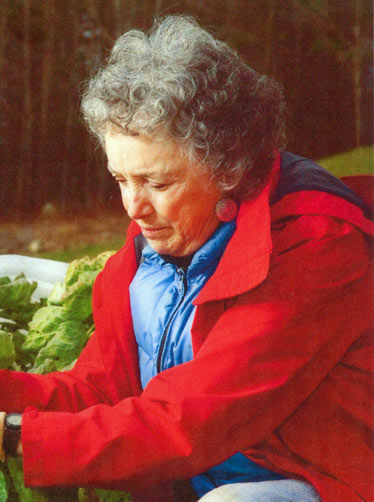
Four generations of Dr. Kathleen Jane Smith's family have an affiliation with Littleton Regional Healthcare (LRH). Kate's mother (Clara Salway) trained as a registered nurse (RN) at the Littleton Hospital School of Nursing, and graduated in the last class of students at the school in 1934. Her grandfather, who worked primarily at the Saranac Glove Company, drove a horse-drawn carriage for Drs. Parker and Abbott when their patients required house calls. Today, Dr. Smith's niece, Sadie Starring, is a registered nurse at Littleton Regional.
After graduation from Littleton High School, Kate attended Bennington College in Vermont and graduated with a major in Natural Sciences with an emphasis in chemistry. She moved to Seattle and worked as a lab tech in the Zoology Department at the University of Washington. Kate did not always know that becoming a physician was in her future, although early-on, she was exposed to the medical profession. Her mother, a nurse, had deep admiration and respect for doctors. Also, Kate had repeated exposure to medical care and post op recovery due to prolonged treatment for scoliosis. Spending an entire year in a full body cast gave Kate, the scientist, a great deal of time to keenly observe her care and develop a fascination for the medical profession. In addition, reading a Dartmouth Medical School student's textbooks further captured Kate's curiosity. Persuaded by her good friend, Peggy, Kate applied to the University of Washington School of Medicine. The School accepted her as one of ten women in a class of 100 medical students. Kate loved all of her experiences, and upon graduation from medical school in 1976, she was unclear on a choice for internship and residency. She tried Internal Medicine and Physical Medicine and Rehabilitation, finally settling on a Family Medicine residency at the University of Kentucky. Once Kate finished residency, she practiced in Pennsylvania for two years where she met and married her husband, Jeff.
In 1984 Kate and Jeff moved to Littleton where Kate sustained a private practice from 1984 to 2009. Dr. Smith cites the time when Dr. Virginia Alvord became her practice partner in 1997 as the best of times, professionally. In 2009, they sold their practice to LRH, where Kate practiced as an employed LRH physician until 2012. Kate is very proud and thankful for the opportunity to establish a medical practice with Dr. Alvord where she was able to detect illnesses and refer patients for treatment, thus saving lives. She says "preventative medicine was my passion and my pride. I knew that I was doing good by fostering prevention and doing my best to detect disease while it was still in the early stages."
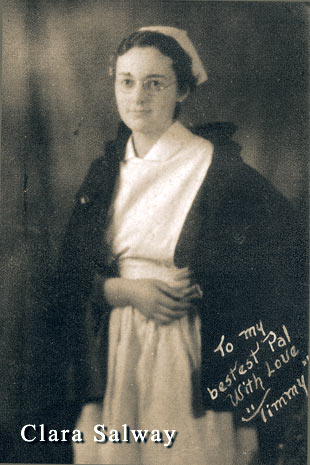
Kate greatly admired Harry McDade, MD. In reference to Harry, she said he was "the great general surgeon who would never compromise on quality of care, and held the patient's welfare above all. He had such lofty ethical standards, in my opinion, that he was the proverbial "rising tide raising all ships" for the rest of us. He did not hesitate to speak his mind in no uncertain terms, if he saw a medical staff or hospital decision that might damage quality of care."
As Dr. Smith reflects on the challenges of today's healthcare, she cites the transition from private practice to practicing as a hospital employee and the use of the computerized medical record as barriers to establishing and maintaining good communication with patients. Also, when a physicians' patients are admitted to the hospital, a clinician known as a "hospitalist" oversees their care. Although this increases efficiencies, it creates professional isolation, and diminishes the all-important patient-physician relationship. Dr. Smith wants people to remember that LRH was formed in 1906 when physicians recognized that the whole community needed a hospital in the Littleton area. "The physicians were affiliated only by their common concern for the patient good, and everyone worked to that end."
Now that Dr. Smith no longer sees patients in the practice setting, she is very engaged in gardening, knitting, and beekeeping. And... she is still fascinated by all things medical, participating in online courses such as immunology and neuroanatomy.
Source
Personal interview, January 2019
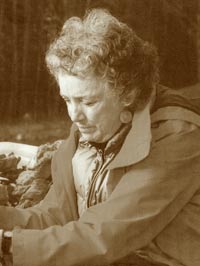
Dr. Kathleen (Kate) Jane Smith
Dr. Frank G. Dudley
×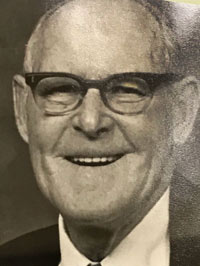
Frank G. Dudley graduated from Amherst College in 1930 and from Columbia University College of Physicians and Surgeons in 1934. He did his internship at the House of Mercy Hospital in Pittsfield, MA, subsequently starting a general practice in Wallington, VT until 1940. Dr. Dudley then completed a residency at St. Joseph's Infirmary in Atlanta, GA, and settled briefly in Rumney,NH, where he started another general practice. Before long, Dr. Dudley entered the service, with posts in Ireland, England, North Africa, and Italy.
Prior to arriving in Littleton, Dr. Dudley took an anesthesiology course at Fort Dix in New Jersey. Dr. Dudley was the anesthesiologist at Littleton Hospital from 1946 to 1986. According to Sara Dudley, Dr. Dudley's wife, "Prior to his arrival, the hospital's superintendent of nurses poured ether as an anesthetic during operative procedures. This nurse also served as the hospital's administrator, by the way. When Dr. Dudley came, he purchased all the necessary anesthesia equipment with his own money to establish the department. Eventually, the hospital was able to upgrade the equipment on its own." In addition to his duties as anesthesiologist, Dr. Dudley had a general practice and was a popular obstetrician. According to Mary Warren, a maternity nurse, Dr. Dudley "was just a terrific person and physician. His good nature and humor brought humanity to everything he did." Wilbur Willey echoed this opinion in his article in The White Mountain Shopper, citing that "Frank was an amazing, multifaceted person. He was a fine mixture of physician and family man, and beyond those two overriding concerns, he had many interests." In addition to medicine his interests include skiing (Wilbur Willey referred to him as an expert skier), music, and singing. He also golfed and enjoyed playing bridge. Students involved in sports at Littleton Public Schools benefited from Dr. Dudley's support, as he attended as many games as his schedule permitted, and he cared for injured athletes. Dr. Dudley was a member of American Medical Association (AMA), NH State Medical Society, NH Component Society, and he was a Fellow in the American College of Anesthesiologists. On May 26, 1994 Littleton Regional Hospital dedicated the Anesthesia Department to Dr. Dudley.
Sources
(1956, November 8). Littleton Courier
(1993, October 30). The White Mountain Shopper
Interview, February 2019

Dr. Frank G. Dudley
Lon W. Howard, MD
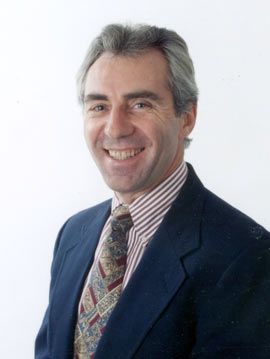
Doctor Howard began his Orthopedic Medicine practice in Littleton in 1988, after completing his orthopedic residency at the University of Louisville in Louisville, Kentucky. Having graduated from the Beverly Cooperative Trade School in 1967 as a machinist, he immediately enlisted in the Air Force and served in both Vietnam and Germany. While serving, Lon worked as an orthopedic technician and found his true calling. Lon Howard was an accomplished athlete. He was a member of the Air Force ski and football teams, competing in the first NATO ski meet. He earned a scholarship to play football for the University of Rhode Island. Dr. Howard received a B.S. degree in Zoology and went on to medical school at the School of Medicine at the University of Massachusetts in Worcester, MA. He realized his dream and completed a residency in Orthopedics at the University of Louisville in Louisville, Kentucky in 1988.
For the next 24 years, Dr. Howard tirelessly served his family, friends, and community providing exemplary orthopedic care in the North Country. His accomplishments include being a Fellow of the American Academy of Orthopedic Surgeons (AAOS), serving on the AAOS Board of Counselors, serving as the president of the NH Medical Society, Grafton County Medical Society, and LRH Surgical Staff. Dr. Howard also served on the LRH Board of Trustees.
Dr. Howard touched the lives of many and is fondly remembered for his determination, integrity, unfailing sense of humor, compassion, and uncanny ability to reach people on a very personal level. His colleagues knew him as a level-headed person who sincerely cared about the patients' concerns. He was a mentor and friend to many. Those who knew Dr. Howard remember him as an inspiring leader of the medical community dedicated to his patients and the greater community.
Sources
Littleton Regional Hospital publications
Union Leader, October 30, 2012
